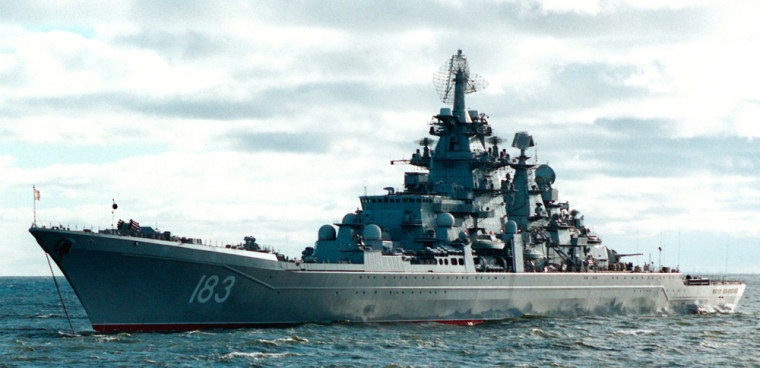Three hours after saying one of Russia’s most powerful ships was in disrepair and could “explode” at any moment, navy chief Adm. Vladimir Kuroyedov on Tuesday retracted the comment, saying the nuclear-powered Peter the Great missile cruiser was safe and in no danger.
Kuroyedov said Russian news agencies misunderstood his initial statement, but others attributed the flap to infighting among navy brass.
Kuroyedov’s suggestion that the Peter the Great was unfit for service could have stemmed from his personal feud with the uncle of the ship’s captain, or from his role in the sinking of a decommissioned nuclear submarine last year — a disaster that deeply embarrassed the navy, the business newspaper Kommersant said.
Kuroyedov gave his comments to Interfax and ITAR-Tass news agencies in a smoking room on his way to a meeting of top military officials.
First, he said the massive cruiser had been badly maintained.
“Everything is all right on the ship where admirals walk, but in the areas where they don’t, everything is in such condition that it may blow up at any moment,” Kuroyedov was quoted as saying.
“It’s especially dangerous because it has a nuclear reactor,” he added, giving no details on the ship’s condition but suggesting the reactor was the problem.
Then, he said he had ordered the captain to fix flaws in the ship’s maintenance within two weeks — a length of time that seemed to contradict the urgency of initial, alarmist statement.
'No threat whatsoever'
Three hours later, he took it all back.
“There is no threat whatsoever to the ship’s nuclear safety,” he said in a statement. “The ship’s nuclear safety is fully guaranteed in line with existing norms.”
Some flaws in maintaining the cruiser’s living quarters would be fixed within three weeks, he said, after which the ship would become fully combat-ready.
In its report, Kommersant noted that Kuroyedov’s has a personal conflict with Retired Adm. Igor Kasatonov, uncle of the cruiser’s captain, Rear Adm. Vladimir Kasatonov.
It also said Kuroyedov could have aimed his jab at the Northern Fleet’s ex-chief, Adm. Gennady Suchkov, who was relieved of his duties temporarily pending investigations into the sinking of the decommissioned nuclear submarine in August.
Kuroyedov had tried to shift blame for the disaster to Suchkov, but Kasatonov had testified in court that the navy chief bore the main responsibility. Nine of 10 crewmen aboard the K-159 sub died when it sank in a howling storm on its way to a scrapyard.
Kursk connection
Russian media also have criticized Kuroyedov over his role in the sinking of the Kursk nuclear submarine in 2000 and his failure to improve the navy’s degrading condition. Many expected President Vladimir Putin to fire Kuroyedov, but he has managed to cling to the job.
In the latest blow to Russian military prestige, the navy failed to perform missile launches from nuclear submarines during last month’s ambitious maneuvers — personally overseen by Putin.
Kuroyedov, who watched the maneuvers from the Peter the Great, claimed that the first of two scheduled launches had never been planned despite numerous announcements to the contrary. The statement was widely ridiculed by Russian media.
On Tuesday, he said the second failed launch of a RSM-54 missile was due to its age.
“The missile was manufactured in 1987 and had a designated lifetime of 7 1/2 years,” Kuroyedov said, adding that the navy now considers its RSM-54 missiles only 95 percent reliable.
The post-Soviet funding squeeze has badly hurt the navy, prompting it to mothball a large number of ships and keep most others docked for years because of shortages of fuel and spare parts.
